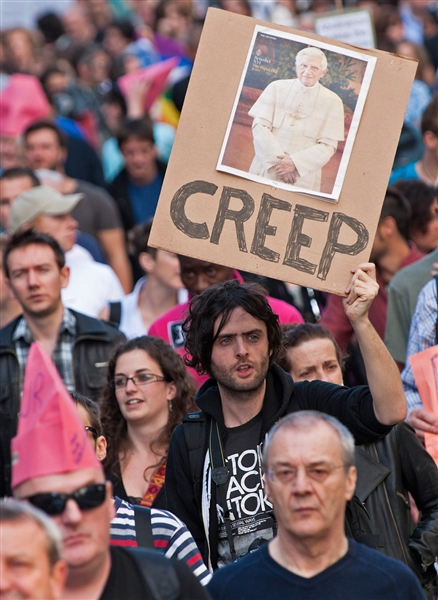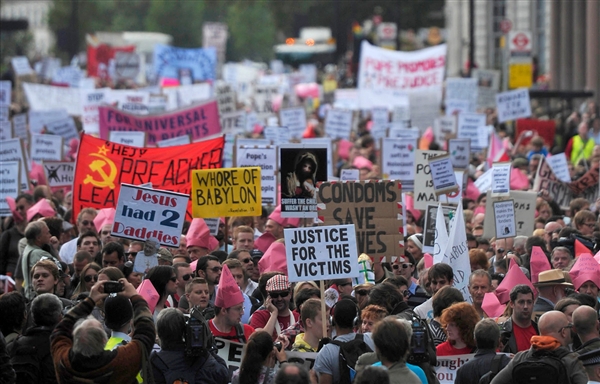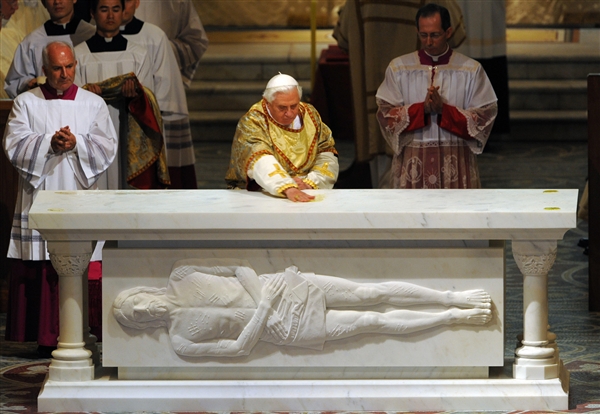"Woefully Inadequate" or a "Great Reformer': Child Sex Abuse Crisis Overshadows Benedict's Legacy
By Miranda Leitsinger
As Pope Benedict XVI’s prepares to step down, his legacy is being viewed through the prism of how he handled the child sex abuse crisis, with some observers saying he dealt with it aggressively while others calling his response to the scandals “woefully inadequate.” During Benedict’s eight-year papacy, thousands of people came forward to claim that they had been raped or molested by priests as children, and that bishops had covered it up. As Cardinal Joseph Ratzinger, it was Benedict’s old office that dealt with abuse cases, yet he never admitted failure by himself or of the Vatican, and never punished bishops who ignored or covered up the abuse. “It’s hard to escape the fact that his biggest challenge was the sex abuse crisis and it really didn’t get better during his papacy,” said Michael D’Antonio, author of the upcoming book “Mortal Sins: Sex, Crime, and the Era of Catholic Scandal.” “And in fact, one can see that the church declined in moral authority, especially in the developed world and that includes places like Ireland and Belgium, which were until a few years ago the most Catholic and the most conservatively Catholic countries in the world. And all of this, I really think is traceable to his failure.” Benedict was “locked into an institution that may not be able to deal with this in a structural way,” he added. “He could go around and minister to victims, which he did, and I think that was a brave and profound thing to do, but he couldn’t change the definitive elements of the Catholic Church that enable abuse.” Benedict made apologies and met with victims in the United States, Australia, his native Germany, Britain and Malta. The church also paid out more than $2.1 billion in settlements from 2004-2011 to victims, according to the United States Conference of Catholic Bishops. In 2002, before he took up the papal post, a zero tolerance policy was implemented. But those efforts were not enough, critics said. One victims’ rights group, the Survivors Network of those Abused by Priests, called on Benedict to use his remaining days in the post to turn that around by forcing bishops to reveal the names of those priests facing credible accusations of abuse.
“We can’t mistake words for deeds and, you know, actions speak louder than statements and to be honest with you, we feel that his response has been woefully inadequate,” said Barbara Blaine, the group’s president. Another group, BishopAccountability.org, a library and internet archive of the scandals, welcomed the church’s efforts to address the troubles among its ranks, such as tackling the issue directly on the Vatican website and by making adjustments to its youth policy. But the site’s founder, Terence McKiernan, said Ratzinger, even before taking on the papal post, was dogged by the scandal since he had read so many of the accounts of abuse in his role as prefect of the Congregation for the Doctrine of the Faith. He said Ratzinger had followed Pope John Paul II’s policy of not defrocking all accused priests — noting that the church was already concerned about losing priests to old age and dwindling seminary numbers. “I think that it’s a huge opportunity missed, you know, people will say he did things and that’s certainly true,” McKiernan said. “But given the enormity of the crimes … and given the enormous power that the Pope has, I think that you could say that Benedict reacted to all of this rather than taking action. And apologies and nice speeches are not the same as actually taking vigorous action to remove the people responsible and revealing all the information that needs to be revealed. So it’s an opportunity missed, and I think as a result, the church has lost incredible amounts of credibility in all this.”
Benedict officially leaves office on Feb. 28. One of those who will participate in electing his successor, Retired Cardinal Roger Mahony, Archbishop Emeritus of Los Angeles, was himself stripped of his administrative and public duties in early February after church personnel files revealed that he and other top Roman Catholic Archdiocese of Los Angeles officials maneuvered behind the scenes to shield molester priests, provide damage control for the church and keep parishioners in the dark, NBC Los Angeles reported. Still, some felt Benedict did step up to tackle the issue engulfing the church. “He inherited a very tragic situation and he confronted it head on and has been a great reformer on this issue,” said Maureen Ferguson, a senior policy adviser at The Catholic Association. “The Catholic Church in the United States is now one of the leading institutions in terms of child protection policies.” Bill Donohue, president of the Catholic League, agreed. “Nobody clearly did more to counter this problem in the Catholic Church,” he said. “ … he did move expeditiously, quite frankly, with a lot greater aggressiveness than his predecessor. John Paul II was a great man but this issue did languish there in the Vatican until Joseph Ratzinger … was able to deal with it.” Donohue said that about a month before Ratzinger was named Pope, he spoke about the “filth” in the Catholic Church, referring to priests who were sexually abusing children. He also banished a popular priest from ministry, Father Marcial Maciel, the founder of the Legionaries of Christ, who was accused of sexually abusing underage seminaries, according to the National Catholic Reporter. “He took a position which took a great deal of courage to go against a very popular priest,” Donohue said. “An investigation of him had begun (under) John Paul II but it took Benedict to finish him, and he did finish him.” “I think history will treat him very well in terms of dealing with the problem,” he added. “I think the issue is basically behind us, almost everything we hear today are these old cases.” But D’Antonio wasn’t sure history would be so favorable to Benedict. “He would have had to pick up the church and drag it into the 21st century but, you know, he could have,” he said. “He might have died trying, the stress of that might have been even more profound, he would have faced tremendous intrigue and opposition, but I suspect that instead he may go down in history as a caretaker, an interpersonally kind pastor who made no mark when he had the chance to.”
|
.
Any original material on these pages is copyright © BishopAccountability.org 2004. Reproduce freely with attribution.


